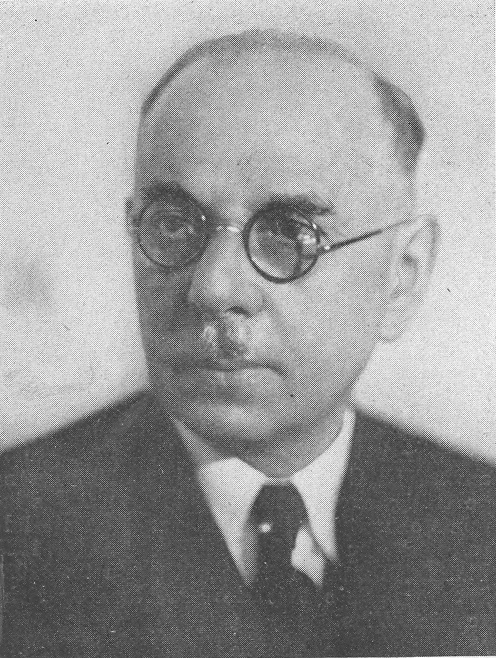Wolfgang Pauli
| Born: |
09-11-1869 |
| Faculty: |
Medical School | Medical University Vienna |
| Category: |
Expelled teacher |
Wolfgang PAULI (born on September 11th, 1869 in Prague, Bohemia/Austro-Hungaria [Praha/Czech Republic], died on November 7
th, 1955 in Zurich/Switzerland) was extraordinary emerited professor for biological-physical chemistry at the Medical School of the University of Vienna
He was persecuted in times of Nazism for racist reason, lost his position and was thrown out of the university on April 22
nd, 1938. In 1938 he emigrated to Switzerland and became professor at the University of Zurich.
Pauli, the son of a book-seller,[1] studied medicine, physics and chemistry in Prague[2] and obtained his doctorate degree in 1893.[3] He then worked as an assistant at the Rudolf hospital as well as at the outpatient clinic in Vienna[4] and habilitated in 1899[5] for internal medicine at the University of Vienna. In that same year he also converted from Judaism to Roman Catholicism. Four years later he became head of the physical-chemical department at the Biologische Versuchsanstalt (Biological Research Institute).[6] The appointment to the position of associate professor in 1913 marks the next important step in Pauli’s career.[7]
During the First World War, Pauli was chief of medicine at the war hospital in Grinzing.
[8] In 1920 he became a full professor
[9] and also was appointed chairman of the institute for physical-chemical biology.
[10] He had previously declined an offer to become a professor at the University of Ljubljana.
[11] In 1922, he took over the newly established institute for medical colloidal chemistry.
[12] After retiring at the end of September 1934, he still was the provisional head of the institute, while also acting as honorary professor at the University of Vienna.
[13]
After the “Anschluss”, the ministry of education prohibited him from further carrying out his honorary professorship,
[14] because he was considered a “Jew” according to the “Nuremberg laws”. In 1938 Pauli fled to Zurich, Switzerland,
[15] where he was able to work at the chemical institute of the University of Zurich under Paul Karrer.
[16] After the end of the war he did not return to Austria and the University of Vienna.
Pauli was a member of the German Academy of Sciences Leopoldina (1904) and a corresponding member of the Viennese (1937) as well as the Bavarian Academy of Sciences (1950).
[17] Before the “Anschluss”, he also had been the chairman of the physical-chemical department of the Academy of Sciences in Vienna.
[18] In 1948 he became an honorary member of the Association of Austrian Chemists
[19] and was awarded an honorary medical doctorate by the ministry of education in 1954.
[20] He was also bearer of the Haitinger-award of the Academy of Sciences (1916), as well as the Leonard-award of the German Colloidal Society (1921).
[21]
Pauli’s main areas of expertise were electrophoresis, medical colloidal chemistry, electrodialysis and physical chemistry of plant colloids. Among his most famous works are “Elektrochemie der Kolloide” (1929) and “Kolloidchemie der Eiweißkörper” (1935).
[22]
Lit.: Austrian State Archive/AVA, PA Pauli; Archive of the University of Vienna/MED PA 393, RA GZ 677 ex 1937/38; Doris Freudig/Klaus Günther Collatz, Lexikon der Naturwissenschaftler. Astronomen, Biologen, Chemiker, Geologen, Mediziner, Physiker. Heidelberg/Berlin u. a. 1996; KILLY/VIERHAUS 1995-2000, Vol. 7, 1998; MERINSKY 1980, 187-188; MÜHLBERGER 1993, 29; PLANER 1929; RÖDER 1983, vol. 2; TEICHL 1951; Franz Seelich, Nachruf, in: Die Feierliche Inauguration des Rektors der Wiener Universität für das Studienjahr 1956/57, Wien 1957, 44; DEICHMANN 2001, 115, 122, 157, 189, 379, 393; Gedenkbuch für die Opfer des Nationalsozialismus an der Österreichischen Akademie der Wissenschaften; UB MedUni Wien/van Swieten Blog.
[1] Franz Planer (Hg.), Das Jahrbuch der Wiener Gesellschaft, Wien 1929.
[2] Walther Killy/Rudolf Vierhaus (Hrsg.), Deutsche Biographische Enzyklopädie. Bd. 7, Berlin u.a. 1998.
[3] UA, PA, fol. 5, Personalangabe, o. D.
[5] UA, PA, fol. 5, Personalangabe, o. D.
[7] Franz Seelich, Nachruf, in: Die Feierliche Inauguration des Rektors der Wiener Universität für das Studienjahr 1956/57, Wien 1957, 44.
[9] ÖStA/AVA, Staatsamt f. Inneres und Unterricht Nr. 17.736/1920, Österreichische Präsidentschaftskanzlei an Präsidium des Staatsamtes für Inneres und Unterricht, 3. 9. 1920.
[10] Seelich, Nachruf, 44.
[11] Vgl. ÖStA/AVA, fol. 24, Pauli an MED Dekanat, 3. 1. 1920.
[12] Seelich, Nachruf, 44.
[13] UA, PA, fol. 130, BMU an MED Dekanat, 26. 7. 1934.
[14] UA, RA GZ 677-1937/38, O.-Nr. 62, Österreichisches Unterrichtsministerium an MED Dekanat, 22. 4. 1938.
[15] Werner Röder/Hannah Caplan (Hrsg.), Biographisches Handbuch der deutschsprachigen Emigration nach 1933. Bd. 2, München 1983.
[16] Seelich, Nachruf, 44.
[17] Killy, Enzyklopädie.
[18] Werner Röder/Hannah Caplan (Hrsg.), Biographisches Handbuch der deutschsprachigen Emigration nach 1933. Bd. 2, München 1983.
[19] Robert Teichl, Österreicher der Gegenwart. Lexikon schöpferischer und schaffender Zeitgenossen, Wien 1951.
[20] Vgl. UA, PA, fol. 153, MED Dekanat an Prof. Schwarzacher, 3. 2. 1958.
[21] Franz Planer (Hrsg.), Das Jahrbuch der Wiener Gesellschaft, Wien 1929.
[22] Doris Freudig/Klaus Günther Collatz, Lexikon der Naturwissenschaftler. Astronomen, Biologen, Chemiker, Geologen, Mediziner, Physiker. Heidelberg/Berlin u. a. 1996.
Andreas Huber (translated by Thomas Rennert)
